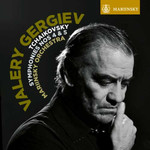|
Back
09/26/2019
Pyotr Ilyich Tchaikovsky: Symphony n° 4 in F minor, opus 36 [1] – Symphony n° 5 in E minor, opus 64 [2]
Mariinsky Orchestra, Valery Gergiev (conductor)
Live recording: Salle Pleyel, Paris, France (January 25 [1] and 26 [2], 2010) – 96’30
Mariinsky MAR0017 – Booklet in Russian, French and German (Distributed by PIAS)

   
Conductor warhorse, Valery Gergiev, is a profound mainstay in the Russian repertoire, and in this Mariinsky recording, we hear close to absolute purity. It should be noted that this 2010 live audio recording in the Salle Pleyel was also, simultaneously, captured on film by a co-production of LGM and Mezzo.
Both Symphony n° 4 and n° 5 have fundamental gravitas. Feisty, while at times, passive, explains how M. Gergiev races through Tchaikovsky’s music with an ominous and heroic grandeur. The quality unveiled by the imposing maestro exercises restraint with unrelinquished stamina and drama. This aspect ‘fits the bill’ for Tchaikovsky, in the purest sense of the word.
A restrained temperament can immediately be heard during Symphony n° 4’s “Andante sostenuto” with imposing moderation, though hidden (not alarmingly so) by the more dominating ‘fate’ motif. The Mariinsky Orchestra’s velveteen candor is impressively light, though testy like a bristlecone pine on a lone, wintry night. The seismic quake certainly enchants.
Symphony n° 5 was critiqued live (read here) on January 26, 2010, giving, yet, another interesting perspective of M. Gergiev's direction.
Pertaining to this recording, one hears the bassoon regally establishing an arduous funèbre during the opening measures (and an eloquent statement in the closing bars) of the “Andante.” Maestro Gergiev doesn’t hold back on this weighty lethargy: such sets a realistic stage. Pivotal. Despite its fatalistic approach, the ensuing “Andante cantabile” gives optimism, fittingly outlined by horn and background woodwinds. Clouds dissipate during the middle segment, and it unfurls with irreproachable might. M. Gergiev can show how he commands and demands orchestral diction within the penultimate “Valse: Allegro moderato”: the passage is sound and substantive…connected and free-flowing. It’s no wonder this Symphony was a World War II musical emblem, in part due to the deeply demonstrative and instructive “Finale.” Here, Valery Gergiev’s firm crescendos and decrescendos live up to fine exclamation: one can’t help but imagine the monumental draw Tchaikovsky had in motivating the Allied powers to success. This is likely the finest track on this CD.
Only one caveat: Christian Lahondès’ sound engineering is inconsistent. While intimacy prevails during the Symphony n° 4, it seems rather hollow and vacuous with an absence of rich bass. Thus, audio fortitude turns more strongly upon the Symphony n° 5. The possible reason? These two Symphonies were recorded on separate dates.
Swiftly paced, yet undeterred by need of pull-backs, M. Gergiev has an unblemished, ingrained manière regarding tempo. What is retained is excellence in control of mood, time and setting.
Despite the heaviness of these two Tchaikovsky works, there’s something that floats within the airwaves. Soufflé eloquence prevails. The Mariinsky Orchestra has preeminence into the gateway of Tchaikovsky’s metrics.
Christie Grimstad
|